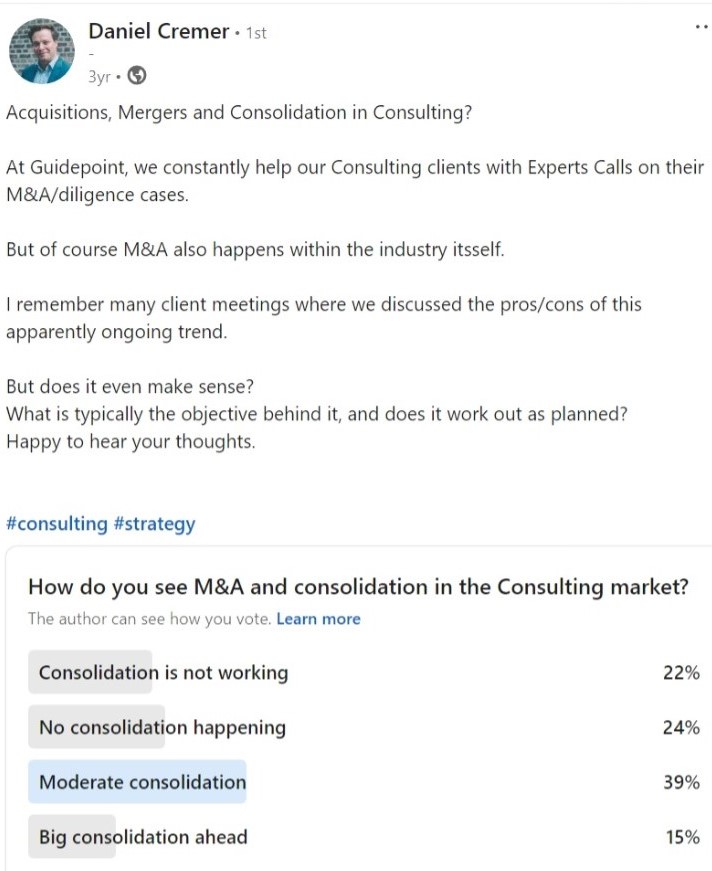Mergers & Acquisitions in Consulting: A Growing Trend or a Misguided Strategy?
The consulting industry, known for its dynamic nature and rapid adaptation to market trends, is increasingly witnessing a wave of mergers, acquisitions, and consolidations. Whether driven by market competition, the need for specialized expertise, or the pursuit of scalability, consulting firms are embracing M&A as a strategic lever to expand capabilities and strengthen market positions.
Daniel Cremer
1/11/20222 min read


My recent poll provided some interesting insights into how industry professionals perceive this trend:
22% believe consolidation is not working.
24% say no consolidation is happening at all.
39% see moderate consolidation occurring.
15% anticipate major consolidation in the near future.
The results reveal a divided industry, with mixed sentiments regarding the effectiveness and necessity of M&A strategies. Let’s explore the key objectives behind consolidation in consulting and whether these mergers live up to expectations.
Why Consulting Firms Pursue M&A
Firms consider M&A for several strategic reasons, including:
Expanding Service Offerings
As client demands evolve, firms seek to provide end-to-end solutions by acquiring niche expertise in digital transformation, sustainability, and AI-driven consulting. M&A helps fill gaps in specialized knowledge without the time and cost of organic growth.Geographical Expansion
Cross-border acquisitions allow firms to establish a global presence, tapping into new markets and serving international clients more effectively. Regional boutique firms often merge with larger players to gain access to a broader client base.Operational Synergies
Consolidation offers opportunities for cost efficiencies by streamlining operations, optimizing workforce deployment, and reducing redundant functions, creating economies of scale and increasing profitability.Technology Integration
With digital transformation at the forefront, consulting firms are acquiring tech-driven boutiques to enhance their data analytics, automation, and AI capabilities, ensuring competitiveness in an increasingly technology-focused market.Competitive Positioning
The consulting industry is crowded, and larger firms can leverage acquisitions to solidify market dominance, gain intellectual capital, and fend off competition.
Challenges of Consolidation in Consulting
Despite the strategic advantages, M&A deals often come with significant hurdles that may hinder their success:
Cultural Integration Issues
Merging firms often struggle to align their corporate cultures, leading to clashes in work styles, values, and operational processes, impacting employee morale and productivity.Client Retention Risks
Clients may perceive a loss of personalized service when boutique firms merge with larger consultancies, leading to potential attrition. Maintaining trust and service quality post-acquisition is critical.Operational Complexity
Larger firms face greater challenges in managing diverse service lines, internal systems, and global teams effectively. The integration of processes and technology can take years to optimize.Overestimated Synergies
Many deals are based on overly optimistic assumptions about cost savings and revenue growth, which may not materialize as expected. Achieving operational efficiencies without disrupting service delivery remains a significant challenge.Market Differentiation Loss
Boutique firms often have a unique identity and market positioning that gets diluted after consolidation, leading to potential loss of competitive advantage.
What Lies Ahead for Consulting M&A?
Based on current industry trends and expert opinions, moderate consolidation seems to be the most likely path forward. Larger firms will continue to acquire specialized players to diversify offerings, but a complete industry overhaul through major M&A activities may not be imminent.
Firms must approach M&A with a clear strategic purpose, robust integration plans, and a strong focus on cultural alignment to ensure success. Those that can strike the right balance between growth and operational excellence will emerge as market leaders.
#Consulting #Strategy #Mergers #Acquisitions #BusinessGrowth #IndustryTrends #CorporateStrategy
Connect
Partnering with you for exceptional leadership solutions.
contact@a-game-search.com
© 2024. All rights reserved.